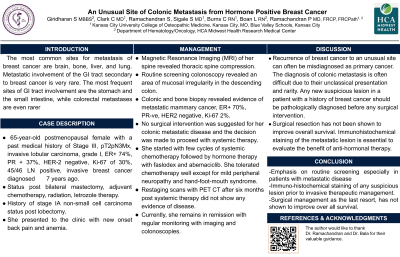Back


Poster Session B - Monday Morning
Category: Colon
B0146 - An Unusual Site of Colonic Metastasis From Hormone Positive Breast Cancer
Monday, October 24, 2022
10:00 AM – 12:00 PM ET
Location: Crown Ballroom

Has Audio

Sindhuja Giridharan, MBBS
HCA
Kansas City, MO
Presenting Author(s)
Sindhuja Giridharan, MBBS1, Christian Clark, BS2, Shreya Ramachandran, 3, Carson R. Burns, MSN, APRN1, Lindsey Boan, RN1, Preethi Ramachandran, MBBS, MD1
1HCA, Kansas City, MO; 2Kansas City University, Kansas City, MO; 3Blue Valley Schools, Overland Park, KS
Introduction: The most common sites for metastasis of breast cancer are brain, bone, liver, and lung. Metastatic involvement of the gastrointestinal tract secondary to breast cancer is very rare. The most frequent sites of gastrointestinal tract involvement are the stomach and the small intestine, while colorectal metastases are even rarer..
Case Description/Methods: We describe a case of a 65-year-old postmenopausal female with a past medical history of Stage III, pT2pN3Mx, grade I, ER positive 74%, PR positive 37%, HER-2 negative, Ki-67 of 30%, 45/46 lymph node positive, invasive breast cancer diagnosed 7 years ago, status post bilateral mastectomy, adjuvant chemotherapy, radiation, adjuvant letrozole therapy and a history of stage IA non-small cell carcinoma status post lobectomy. She presented to the clinic with new-onset back pain and anemia. Upon further investigation, magnetic resonance imaging (MRI) of her spine revealed thoracic spine compression and her colonoscopy revealed an area of mucosal irregularity in the descending colon. Colonic biopsy and bone biopsy revealed evidence of metastatic mammary cancer which was ER positive 70%, PR negative, HER2 negative and Ki-67 of 2%. No surgical intervention was suggested by colorectal surgery for her colonic metastatic disease. Multidisciplinary team decision was made to proceed with systemic therapy. She started with a few cycles of systemic chemotherapy followed by hormone therapy with faslodex and abemaciclib. She tolerated chemotherapy well except for mild peripheral neuropathy and hand-foot-mouth syndrome. Restaging scans with positron emission tomography and computed tomography (PET CT) after six months post systemic therapy did not show any evidence of disease. Currently, she remains in remission with regular monitoring of her disease with imaging and colonoscopies.
Discussion: Recurrence of breast cancer to an unusual site can often be misdiagnosed as primary cancer. The diagnosis of colonic metastasis is often difficult due to its unclassical presentation and rarity. Any new suspicious lesion in a patient with a history of breast cancer should be pathologically diagnosed before any surgical intervention. Immunohistochemical staining of the metastatic lesion is essential to evaluate the benefit of anti-hormonal therapy. Surgical resection should be reserved as a final treatment option as surgical resection has not been shown to improve overall survival.
Disclosures:
Sindhuja Giridharan, MBBS1, Christian Clark, BS2, Shreya Ramachandran, 3, Carson R. Burns, MSN, APRN1, Lindsey Boan, RN1, Preethi Ramachandran, MBBS, MD1. B0146 - An Unusual Site of Colonic Metastasis From Hormone Positive Breast Cancer, ACG 2022 Annual Scientific Meeting Abstracts. Charlotte, NC: American College of Gastroenterology.
1HCA, Kansas City, MO; 2Kansas City University, Kansas City, MO; 3Blue Valley Schools, Overland Park, KS
Introduction: The most common sites for metastasis of breast cancer are brain, bone, liver, and lung. Metastatic involvement of the gastrointestinal tract secondary to breast cancer is very rare. The most frequent sites of gastrointestinal tract involvement are the stomach and the small intestine, while colorectal metastases are even rarer..
Case Description/Methods: We describe a case of a 65-year-old postmenopausal female with a past medical history of Stage III, pT2pN3Mx, grade I, ER positive 74%, PR positive 37%, HER-2 negative, Ki-67 of 30%, 45/46 lymph node positive, invasive breast cancer diagnosed 7 years ago, status post bilateral mastectomy, adjuvant chemotherapy, radiation, adjuvant letrozole therapy and a history of stage IA non-small cell carcinoma status post lobectomy. She presented to the clinic with new-onset back pain and anemia. Upon further investigation, magnetic resonance imaging (MRI) of her spine revealed thoracic spine compression and her colonoscopy revealed an area of mucosal irregularity in the descending colon. Colonic biopsy and bone biopsy revealed evidence of metastatic mammary cancer which was ER positive 70%, PR negative, HER2 negative and Ki-67 of 2%. No surgical intervention was suggested by colorectal surgery for her colonic metastatic disease. Multidisciplinary team decision was made to proceed with systemic therapy. She started with a few cycles of systemic chemotherapy followed by hormone therapy with faslodex and abemaciclib. She tolerated chemotherapy well except for mild peripheral neuropathy and hand-foot-mouth syndrome. Restaging scans with positron emission tomography and computed tomography (PET CT) after six months post systemic therapy did not show any evidence of disease. Currently, she remains in remission with regular monitoring of her disease with imaging and colonoscopies.
Discussion: Recurrence of breast cancer to an unusual site can often be misdiagnosed as primary cancer. The diagnosis of colonic metastasis is often difficult due to its unclassical presentation and rarity. Any new suspicious lesion in a patient with a history of breast cancer should be pathologically diagnosed before any surgical intervention. Immunohistochemical staining of the metastatic lesion is essential to evaluate the benefit of anti-hormonal therapy. Surgical resection should be reserved as a final treatment option as surgical resection has not been shown to improve overall survival.
Disclosures:
Sindhuja Giridharan indicated no relevant financial relationships.
Christian Clark indicated no relevant financial relationships.
Shreya Ramachandran indicated no relevant financial relationships.
Carson Burns indicated no relevant financial relationships.
Lindsey Boan indicated no relevant financial relationships.
Preethi Ramachandran indicated no relevant financial relationships.
Sindhuja Giridharan, MBBS1, Christian Clark, BS2, Shreya Ramachandran, 3, Carson R. Burns, MSN, APRN1, Lindsey Boan, RN1, Preethi Ramachandran, MBBS, MD1. B0146 - An Unusual Site of Colonic Metastasis From Hormone Positive Breast Cancer, ACG 2022 Annual Scientific Meeting Abstracts. Charlotte, NC: American College of Gastroenterology.
